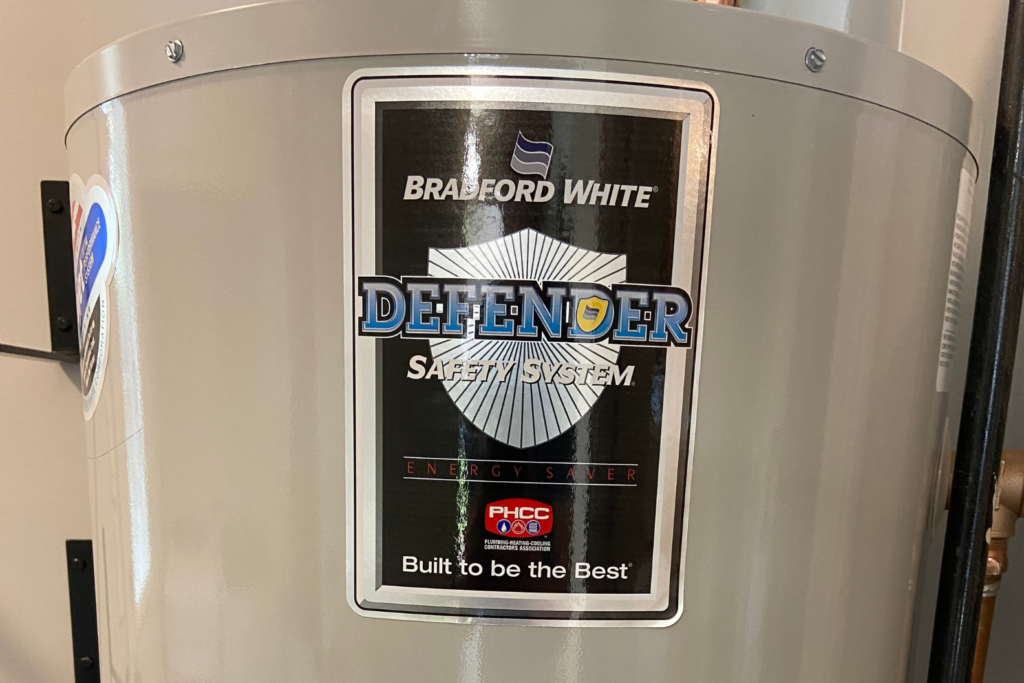Pictured on the blog thumbnail is a new Bradford White water heater that our team installed.
It goes without saying that the water heater is one of many plumbing components that you need working on a consistent basis. Having said that, it should come as no surprise that we often discuss them on our blog and they’re definitely a popular service for our plumbing technicians. Whether that be installing a new water heater, repairing an existing one or providing routine maintenance services, all plumbing professionals need experience working with water heaters.
Given that they serve an important role in our day-to-day lives, it definitely helps to have an understanding of when a water heater likely needs to be replaced compared to when it would make more sense to simply repair it. This can obviously be a tricky decision, as every situation is different. However, it’s important to also note that your local plumbing professional should be able to steer you in the right direction, answer any questions you may have and ultimately help you make the right choice! With that all being said, this week’s blog post is going to take an inside look at that exact dilemma. We’ll be analyzing a few factors that will likely help you in deciding between replacing your water heater and repairing it. As you can likely guess, no water heater is built to last forever, so your best bet in ensuring you get an adequate return on your investment is to maintain it properly and have it installed by a knowledgeable plumber!
Age of Water Heater
While age isn’t the perfect barometer for determining how long a water heater will last (given that we’ve seen heaters last much longer and shorter than the expected lifespan), it is a good starting point. Generally speaking, you can expect storage tank water heaters to last around 12 years and tankless water heaters to last 20+ years. Obviously, there are several factors that will ultimately determine how long a water heater will last, but these are typical estimates.
Anyways, the reason I mention a water heater’s age first is fairly straightforward. If your water heater starts repeatedly having issues, the performance seems to be lacking and you’re forced to call a plumber to take a look at it on numerous occasions, it’s worth it to acknowledge just how old the water heater actually is. If it’s nearing those estimates above, then it would definitely be a good idea to consider the possibility of having a new one installed. Just as can be said with several other plumbing components, manufacturers have consistently fine-tuned their products and added new features to improve efficiency, so there certainly are benefits to having a new one installed. Long story short, one of the first things that might prompt you to consider having a new water heater installed is if there’s repeated issues and it has reached the expected lifespan!
Consistently Running Out of Hot Water
Just as age doesn’t automatically guarantee that you need a new water heater, the same logic applies to our next point as well. When you find yourself constantly running out of hard water, it can mean one of two things. First, it could just mean that your water heater isn’t properly sized for your household’s hot water usage needs. When it comes to a storage tank water heater, there’s a defined capacity in regards to how much water can be heated. If that all gets used up, then you could theoretically run out of hot water for a short time period without there being an issue to the water heater itself. This would be a prime example of where running out of hot water wouldn’t necessarily mean your water heater needs to be replaced (although you may want to rethink your hot water usage routine or potentially consider upgrading the tank size when you get a new heater).
The second scenario would be when you start running out of hot water, but nothing has changed recently in relation to your hot water usage. In other words, if you used to never have any issues with running out of hot water, but have slowly started to have more and more problems, that should raise some concerns. This could just be due to gradual deterioration from the everyday wear and tear or even hard water. Hard water certainly isn’t a new topic on our blog and given that we live in the Kansas City area, it’s likely something we’ll continue to talk about. In addition to a number of other negative effects, hard water can lead to mineral build-up at the bottom of your water heater tank. Unless you flush your water heater on a regular basis, this sediment can accumulate and make your heater work harder to perform its normal responsibilities. The sediment build-up can possess the ability to restrict the amount of hot water available to occupants of the house. All in all, this is another likely instance where you may need to simply replace the water heater to get everything back to normal (and should also be a reminder to add an annual water heater flush to your maintenance to-do list).
Strange Noises
In the majority of cases, when a plumbing component starts making some weird noises, that should instantly demand your attention. Generally speaking, a water heater is able to function rather quietly. What I’m referring to here is when it starts making some strange noises, you’ll know it. Believe it or not, there are a number of different sounds that water heaters can make, but several of them can be attributed to sediment build-up. For example, take a crackling or rumbling sound. These are perfect signs showing that your water heater is trying to fight through this mineral build-up in an effort to heat the water. Yet another reason to flush your water heater!
Leaking Water
While we won’t be covering every single situation that would prompt a water heater replacement today, the final one that we’ll discuss involves leaking water. Without a doubt, any water leak should require immediate attention. After all, it doesn’t take long for water damage to become quite costly. When it comes to your water heater, there are a few different types of leaks to take into consideration. Keep in mind that these vary in terms of severity and some can be fixed relatively inexpensively, while others may require you to replace the actual water heater.
With several components involved in a water heater’s operation, an experienced plumber should be able to evaluate the situation and figure out where the leaking water is coming from. It could be the fittings or expansion tank, which wouldn’t require you to replace the complete water heater. On a separate note, if the leak is coming from a crack or break in the actual tank, then that should force you to get a plumber out right away. Nonetheless, whenever you notice a leak of any kind, it’s never a bad idea to call a plumbing professional to get eyes on the situation.
Call the Water Heater Experts at Stine-Nichols Plumbing
Unsurprisingly, water heaters are something that our plumbing technicians work with just about every single week! While having a new water heater installed is a sizable investment, I’m going to guess that you don’t want to go very long without having hot water, right? We hope you learned a thing or two from this blog post and feel more comfortable in recognizing some of the signs that might signal that you need a new water heater. If you find yourself in this situation, we also encourage you to ask your local plumber for advice too. Every situation is different and they should be able to guide you in the right direction!
Live in the Kansas City area and need some help with your water heater? Our team at Stine-Nichols Plumbing would be more than happy to help! To request a free estimate and speak with a member of our team, you’re more than welcome to give us a call at (816) 348-3481.


